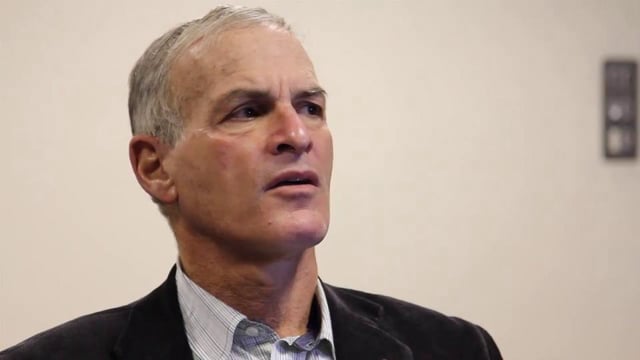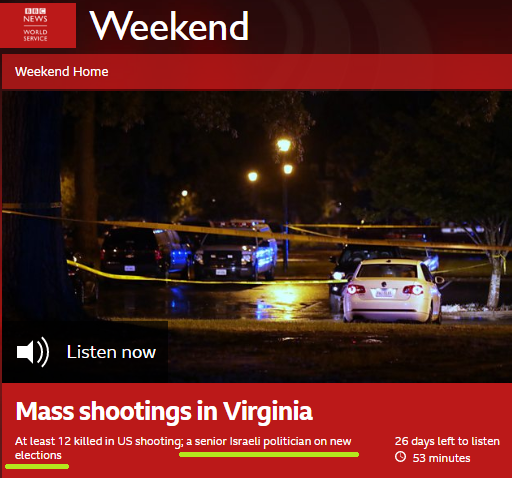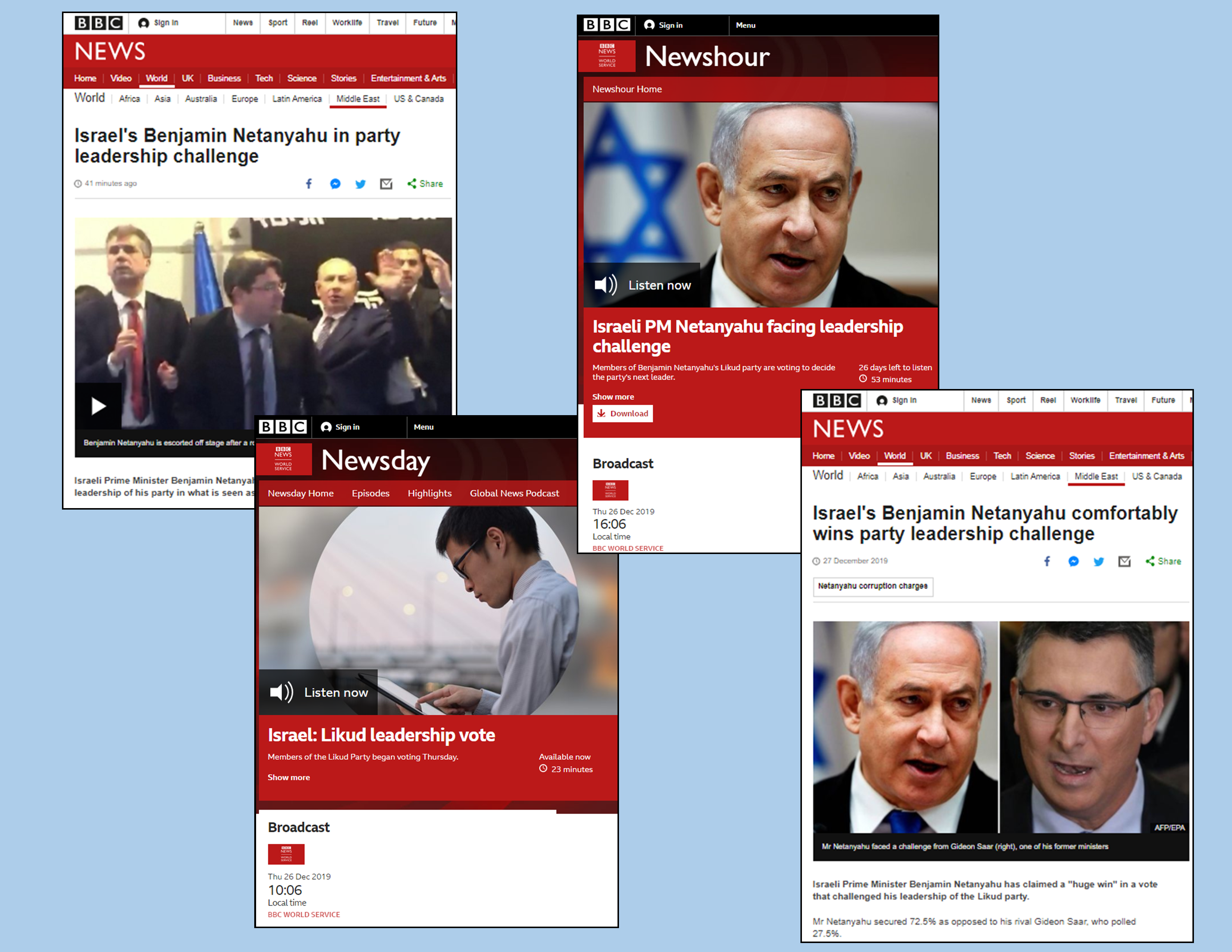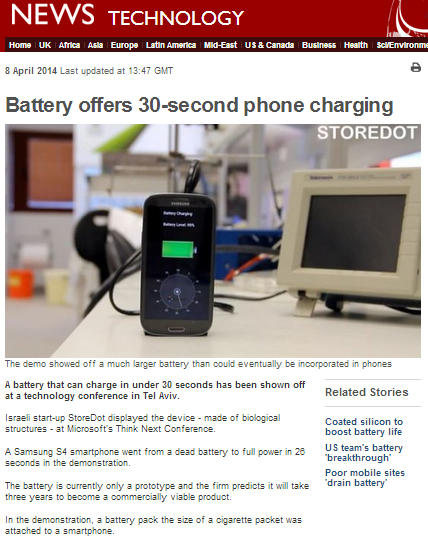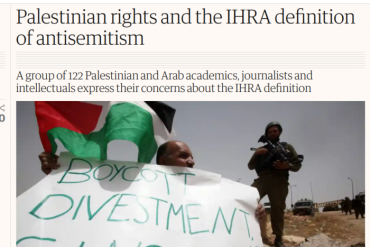BBC audiences are no strangers to unchallenged multi-platform amplification of the ‘apartheid’ smear against Israel.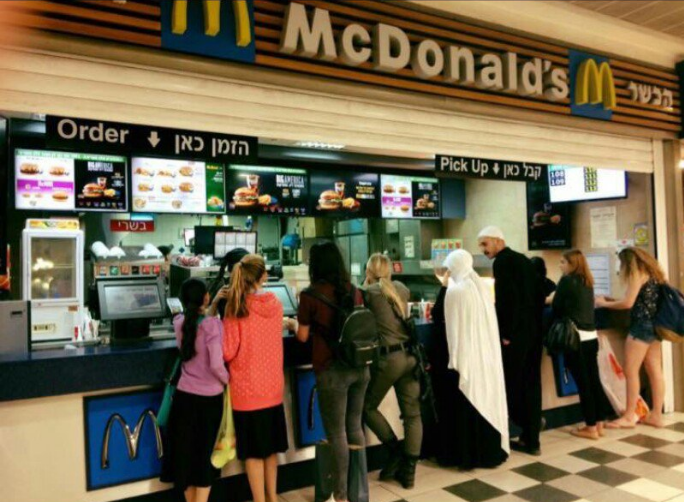
For example, in November 2012, listeners to BBC Radio 4 were told that:
“The ..emm…country [Israel] is run on such apartheid lines it’s possible for the two sides to just literally not see each other.”
In April 2014 visitors to the BBC News website were told by the former BBC Middle East bureau chief that use of the word ‘apartheid’ made (and later walked back) by the US Secretary of State “adds legitimacy to the debate about whether there is an equivalence between the old South African regime and the situation on the West Bank”.
In May 2014 viewers of the BBC News Channel programme ‘Hardtalk‘ and visitors to the BBC News website heard a South African anti-Israel activist say:
“We have seen – I have seen – in Palestine what didn’t exist under apartheid in the worst days of apartheid.”
In January 2015 the BBC News website managed to shoehorn a ‘he said-she said’ version of the ‘apartheid’ trope into a news story:
“Harsh critics of Israel level the charge of apartheid – the system of state-sanctioned racial discrimination once practised by South Africa – against the Jewish state over its treatment of Palestinians and Israeli-Arab minority. Israel says the accusation is baseless and a part of efforts to demonise it.”
In March 2015 listeners to the BBC World Service were told that:
“…practically he [the Israeli prime minister] officially declared Israel as an apartheid state – a segregation state”
And:
“…this would be a long journey and a struggle against the system of apartheid that Netanyahu has created. And that means that we need not only Palestinian popular resistance on the ground but also boycott, divestment and sanctions against Israel in the very same manner that was used against the system of apartheid in South Africa at one point in time.”
And that:
“…as Israel moves further into the open as an apartheid state, that clash with US values will become more apparent.”
In August 2015 the BBC World Service initiated a ‘discussion’ based on the ‘apartheid’ trope.
In September 2015 listeners to BBC Radio Wales were told that in relation to Israel they should:
“…remember the days of apartheid South Africa. People used to hold up these small examples of coexistence […] to gloss over the fundamental reality of institutionalized racism, of apartheid.”
In January 2016 visitors to a local page on the BBC News website found amplification of the claim from an anti-Israel group that “its campaign was similar to international boycotts of South Africa in the 1970s and 80s, when anti-apartheid activists tried to bring down white minority rule.”
In February 2016 visitors to another local page on the BBC News website found the following unqualified information:
“According to its website, Israel Apartheid Week takes place across 150 universities and cities and “aims to raise awareness about Israel’s ongoing settler-colonial project and apartheid policies over the Palestinian people”.”
In April 2016 a BBC News website backgrounder on antisemitism informed audiences that:
“The Palestine Solidarity Campaign says it opposes all racism, including anti-Jewish prejudice and the “the [sic] apartheid and Zionist nature of the Israeli state”…”
And in September 2016 listeners to BBC Radio 4 heard the unchallenged claim of:
“…an occupation that has transformed into a system of apartheid much worse that what prevailed in South Africa.”
Despite all that amplification (and more), not once in those four years has BBC Watch been able to document an explanation having been provided to BBC audiences as to why the ‘apartheid’ trope is false, why used by anti-Israel activists and what is the aim of that tactic.
As has been noted here before:
“As Norman Finkelstein (not one of the better known card-carrying Zionists) pointed out earlier this year [2012], the makers of those demands [the BDS campaign] have one end-game in their sights.
“They call it their three tiers… We want the end of the occupation, we want the right of return, and we want equal rights for Arabs in Israel. And they think they are very clever, because they know the result of implementing all three is what? What’s the result? You know and I know what’s the result: there’s no Israel.” […]
The methods used to try to bring about that end game include the delegitimisation of Israel: the attempt to paint a picture of a country so morally unacceptable that any ‘right-minded’ person cannot possibly tolerate its continued existence.
One way of doing that is to use the ‘apartheid’ trope. By deliberately employing rhetoric which the public associates with a universally morally unacceptable theme, the BDS movement aspires to brand Israel in the minds of the general public with the same stigma as the former racist regime in South Africa.
Of course a close and factual examination of the situation immediately reveals that the use of the ‘apartheid’ trope in relation to Israel is utterly unfounded. But sadly, many if not most members of the general public do not have sufficient knowledge of the facts to be able to assess the ‘apartheid’ trope for what it really is: a rhetorical tactic relying on the human mind’s natural tendency to make associations.”
But in addition to failing to provide its audiences with the context which would enable their understanding of why the false ‘apartheid’ smear is used, the BBC has for the most part also ignored the views of people who really did experience apartheid. A publication produced by ‘Africans for Peace’ provides some interesting insights from four South Africans who have visited Israel.
“In South Africa, I had frequently heard the description of Israel as an “apartheid state.” As a black man coming from South Africa, where we actually experienced apartheid, I realized that this was not apartheid. This was not the same situation.”
“How does it make you feel that the BDS movement compares the situation of the Palestinian people with the plight of black people under apartheid?
It upsets me a lot! A lot! Because it’s misleading! The situation cannot be compared to apartheid because it’s not apartheid. Those people involved with the BDS movement need to go to Israel and the West Bank to see the situation for themselves.”
“Please – don’t steal the word “apartheid!” For black South Africans, apartheid was more than just systematic discrimination against our people. It was a project that aimed to rob a specific race of its history, culture, dignity, and humanity. Those who apply the term “apartheid” to the Israeli-Palestinian impasse are guilty of perpetuating that same theft, by denying the uniqueness of the racism and hatred that we faced, and which we have overcome with much blood and tears. While the challenges that face Israel and her neighbor Palestine may result in one group feeling discriminated against by the other, it is very different from the legally-blessed racism, based on the discredited idea of white supremacy, that once reigned in my country.”
“The reality is that the two situations are very different. I came to understand that the analogy of apartheid in Israel was an abuse of the memory of apartheid, just as it is possible to abuse the memory of the Holocaust or slavery in a similar manner.”
It is high time for the BBC to meet its public purpose remit and its commitment to ‘due impartiality’ by ensuring that its audiences are provided with fact-based information concerning the redundancy of the ‘apartheid’ trope and the true aims of those who promote that tactical smear.

